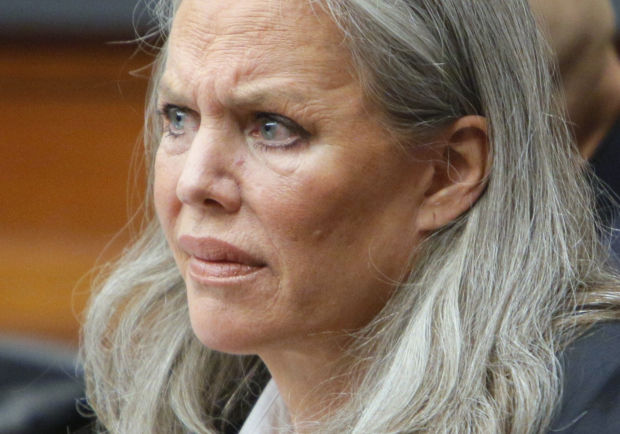Deputy Pima County Attorney Rick Unklesbay told jurors in Pamela Phillips’ murder trial Wednesday the former Tucsonan had her ex-husband killed because she resented losing her big-spending lifestyle after her divorce.
Phillips is accused in Pima County Superior Court of having her former husband, Gary Triano, killed on Nov. 1, 1996. After nearly seven weeks of testimony from nearly 100 witnesses, Phillips’ fate rests with a jury.
In his closing arguments, defense attorney Paul Eckerstrom argued the case against Phillips hangs on the word of a con man who was trying to bilk her out of an insurance payout on her former husband’s death.
Triano, a real estate investor, died when a pipe bomb exploded in the front seat of his car in the parking lot of the La Paloma resort. Phillips was arrested and charged with the crime in 2009.
For the prosecution, the case was simple: Phillips was broke and had her ex-husband killed to get her hands on $2 million from a life insurance policy.
Much of the state’s case hinged on the seemingly secretive arrangement between Phillips and Ronald Young, a man she had a relationship with in Aspen, Colo., after her divorce from Triano.
Young, who in 2010 was convicted of first-degree murder in Triano’s death, helped Phillips with a business venture and acted as a financial adviser of sorts. He later, however, was accused in a series of frauds.
The state used a cache of emails, FedEx records and surreptitiously recorded phone conversations between Phillips and Young to show an arrangement.
“He’s not getting paid for business advice that she never takes — he’s getting paid for murder,” Unklesbay said in his closing arguments.
Recordings that Young made of their conversations became evidence for the state. In one, Young boasts of doing something for Phillips that no one else would have done. “You asked me for some help, some help so you could get rich,” Young said.
In another, Young grows angry with Phillips and threatens, “You’re going to be in a woman’s prison for murder.”
Eckerstrom downplayed the recordings, saying they were examples of a con man’s modus operandi.
He said Young knew he could ruin Phillips’ reputation in Aspen, where she had built a successful career in real estate.
Forensic accountant Robert Semple testified earlier in the trial that he “came to the conclusion there was a financial arrangement” for Phillips to pay Young $400,000 — payments the state argued were made secretively by Phillips to avoid detection from authorities.
Eckerstrom agreed the payments were made in secret. But he said that was because Phillips knew Young was a fugitive in the fraud investigations, and she didn’t want to be accused of hindering prosecution or aiding a felon.
Another prosecution witness, Phillips’ longtime friend Laura Chapman, testified that Phillips once boasted of how easy it would be to hire a hit man to have her ex-husband “taken out.”
Defense attorney Alicia Cata said Phillips said that only because she was distraught after a fight with Triano in which he had threatened her, and that Chapman’s memory of the event was faulty because she had had a brain tumor removed. But Unklesbay said there was no evidence Chapman suffered memory loss.
Phillips’ attorneys presented a complex alternative theory of Triano’s killing. More than simply disputing Phillips’ involvement, the defense attempted to implicate several other people in the murder.
Eckerstrom said Neil McNeice, a former friend and sometime business associate of Triano’s, hired a couple of recently released prisoners from Washington to carry out the killing after learning Triano secured an $80,000 loan with a supposed diamond ring that later turned out to be a cubic zirconia.
McNeice has since died of a drug overdose.
Jeffrey Morris, one of the alleged hit men, denied any involvement in earlier testimony. He acknowledged telling the FBI in 1997 that he had information about Triano’s death, but he said he did that only to try to get a better deal in a counterfeiting case he was implicated in.
Unklesbay disputed the alternative-hit-man theory, noting Morris had just been released from a Washington prison prematurely and by accident, before completing his term.
“We’re supposed to believe that Neil McNeice picked Jeffrey Morris, who nobody knew was going to get out of jail?” Unklesbay said Wednesday.
Eckerstrom theorized the pipe bomb came from McNeice’s longtime friend Jerry Capuano. Capuano, who also is dead, was a radio-controlled-aircraft enthusiast who had used controllers similar to the ones found on the remains of the remotely detonated pipe bomb that killed Triano.
Eckerstrom criticized the police and prosecutors for ignoring the possibility that someone else was responsible for Triano’s death.
“The state went after the easy marks,” Eckerstrom argued. “You have to tell the state: ‘You made a mistake.’ ”
But Unklesbay called the defense theory “fanciful” and asked the jury to consider the evidence of a conspiracy between Phillips and Young.








